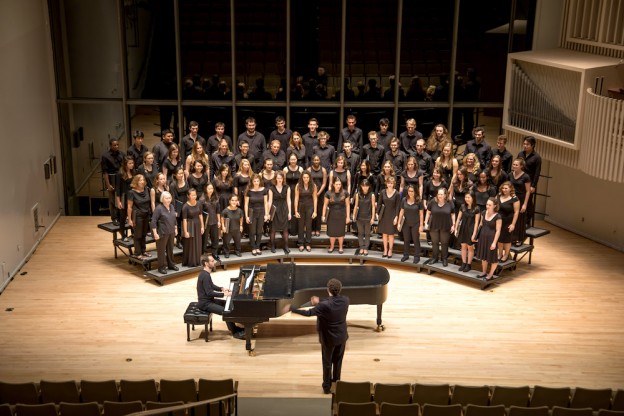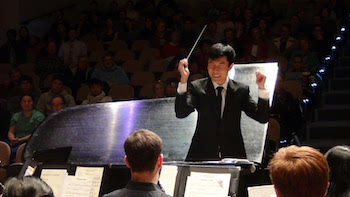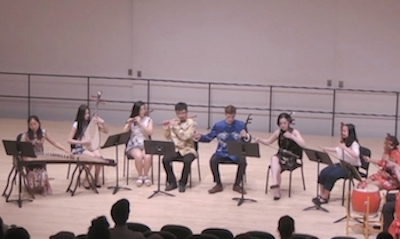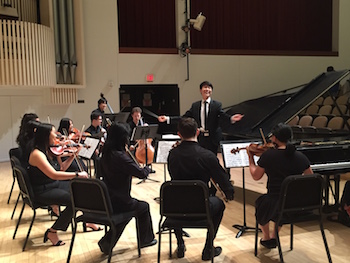The Swarthmore College Chorus and Garnet Singers concert on Saturday, December 9 at 3:00 PM invites its audience to celebrate not only Bach’s music on the 500th anniversary of the Protestant Reformation, but also the voices and experiences of minority composers. The unexpected repertoire, chosen by director Joseph Gregorio, will feature Bach’s “Magnificat,” performed by the entire Swarthmore College Chorus and Orchestra. The Garnet Singers, a subset of the chorus composed of students at the college, will sing pieces around the theme of light and dark.
Though the Garnet Singers will be performing Bach with a piece called “O Jesu Christ Meins Lebens Licht,” the majority of their pieces come from composers not typically represented in classical choral music, such as women, African-Americans, and people of Native American descent. “I’m very aware that it’s difficult for women and minorities to be represented fairly in the classical concert hall and it’s something I wanted to try and work toward with this programming,” Gregorio said. “I try to pick music from throughout history and from as broad a diversity of composers as makes sense.”
From capturing despair to celebrating hope, these composers each bring their own diverse responses to the Garnet Singer’s theme. One piece not only responds to darkness but attempts to make sense of it through a poem by Emily Dickinson, “We Grow Accustomed to the Dark.” Alto section leader Rachel Hottle ’18 composed the piece this year and will perform as a soloist. Two compositions that evoke a sense of hope are “Sure on this Shining Night” by Samuel Barber and “My Lord, What a Mornin,’” composed by the grandfather of African-American spiritual arrangers, H. T. Burleigh. “The setting is very much at dawn,” Gregorio said of the Burleigh piece. “There’s darkness and there’s the realization of approaching light.”
One of the most unorthodox pieces of the repertoire is the Ute Sundance, a piece sung with vocables instead of lyrics. Ethan Sperry adapted the composition for chorus with the permission of Valerie Naranjo, who based the original composition off of a yearly ritual that her Ute ancestors performed. “The Sundance was historically a very difficult and painful dance ritual,” Gregorio said. “It was thought that through the Sundance, all of the grudges and disappointments and bad feelings of the previous year are cleansed and washed away, so it’s a ritual of purification, really, and the idea that was by the suffering taken on by these dancers, the community was washed clean of all of those bad feelings.”
Reena Esmail, who was a new student at Juilliard when the Twin Towers fell, composed “Ritual” in the wake of the attacks. The “constellation of notes that evoke fear and uncertainty,” as Gregorio notes, express the apprehension that Esmail felt. She based her composition off of a William Stafford poem that she encountered in class the day before 9/11: “As we…began to reel at the overwhelming magnitude and gravity of the situation, there was only one phrase that emerged from the chaos. It was the last line of Stafford’s poem. The darkness around us is deep,” she writes on her blog.
During the second half of the concert, the college chorus and the orchestra will perform “Magnificat,” a liturgical composition based on a Latin biblical hymn. Andrew Kim ’18 will perform as assistant conductor of the piece. In addition, for the first time in many years, professional vocalists will perform with the group, including Swarthmore voice instructors Clara Rottsolk and Nancy Jantsch. This year marks 500 years since Martin Luther posted his 95 theses, initiating the Protestant Reformation. Luther greatly influenced Johann Sebastian Bach, whose musical career is closely associated with the Lutheran reformation. “The music of Johann Sebastian Bach is one of the most beautiful results of the Reformation, so I wanted to pay some sort of homage to that,” Gregorio said. “The spectacle of the chorus singing Bach, whose music is very intricate, very florid, but absolutely glorious in sound—I’d like to think that could lift anyone out of a bad mood.”
The pieces that the chorus will perform at their fall concert will evoke emotions ranging from despair to apprehension to joy. The depth of the repertoire will provide an enriching and awe-inspiring experience for all who attend.
Bayliss Wagner ’21



